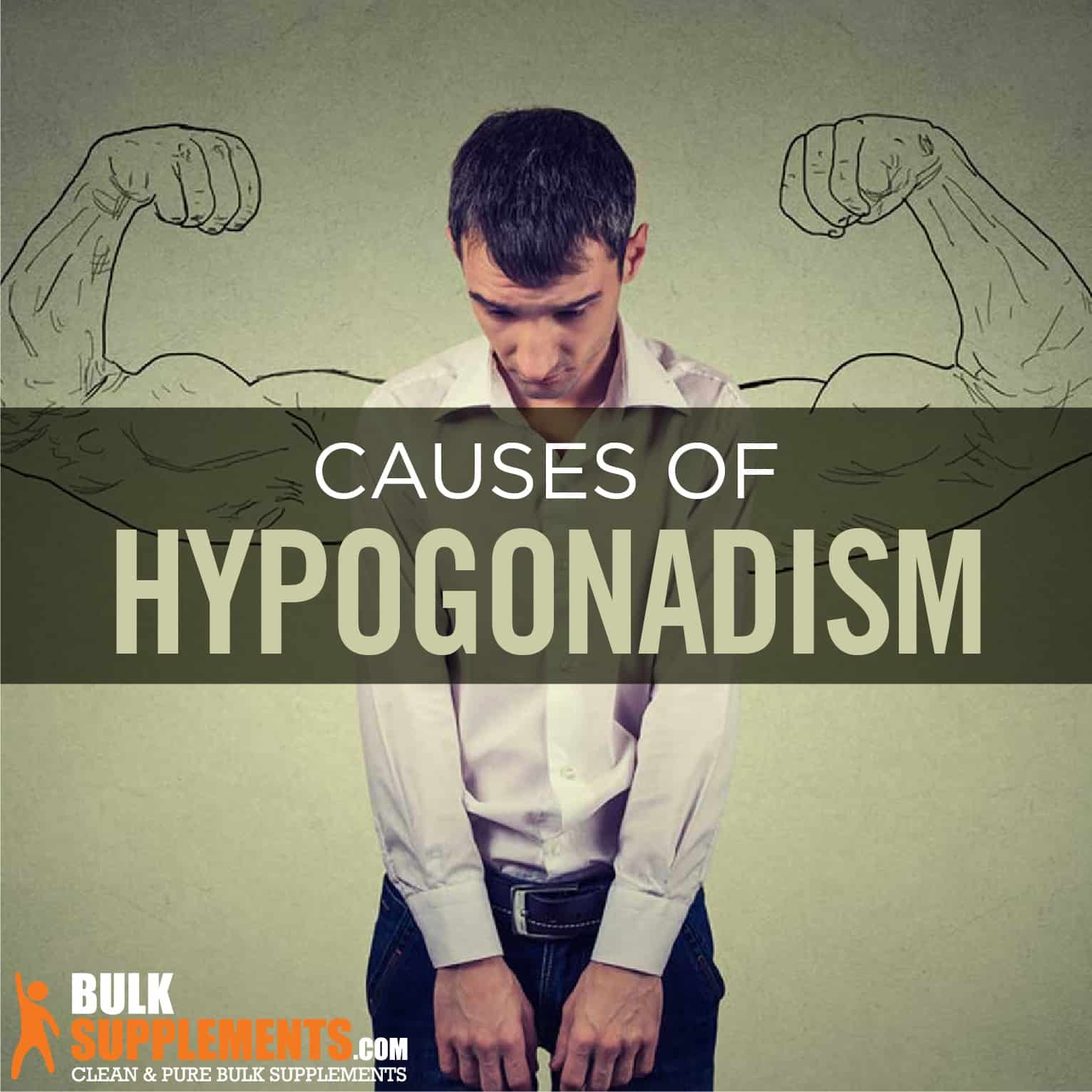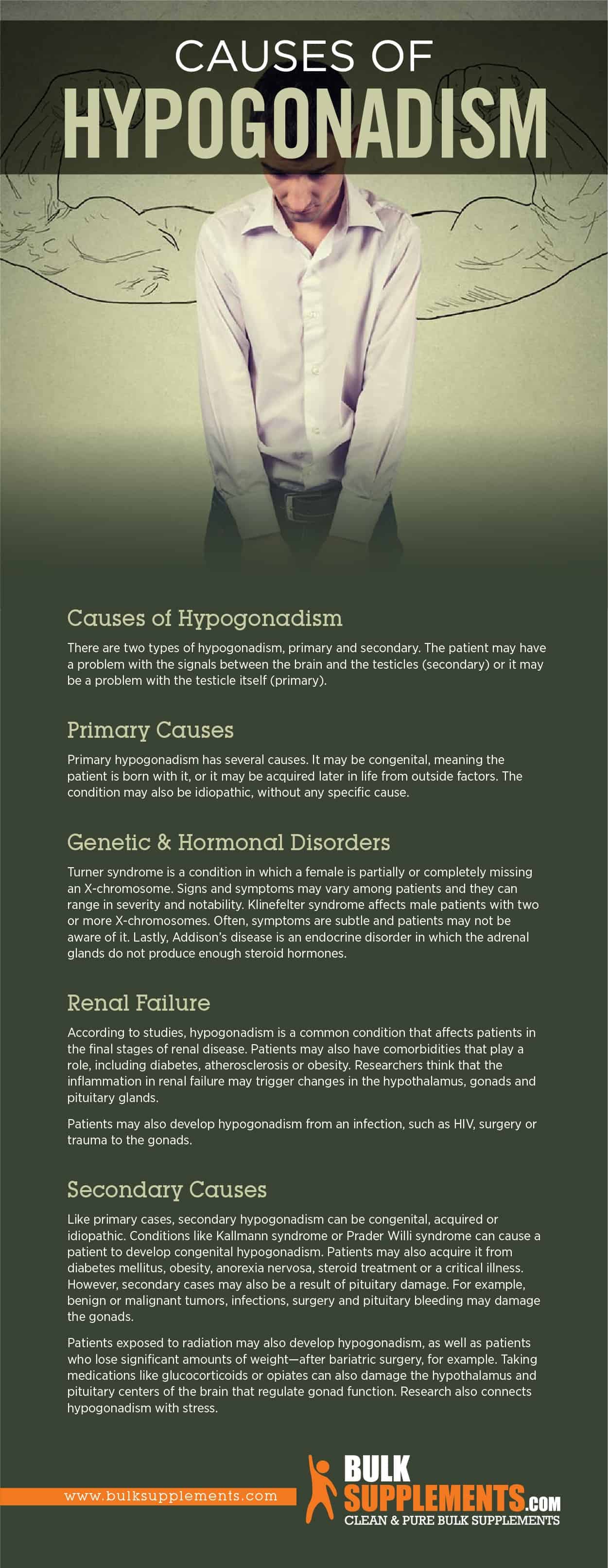Hypogonadism: Causes, Symptoms & Treatment
by James Denlinger Digital Marketing Strategist
What is Hypogonadism?
Hypogonadism is a condition that affects a patient’s gonads, diminishing or reducing their functional and physiological activity. Gonads are organs that produce gametes—the testicles or the ovaries that produce estrogen, progesterone and testosterone. Diminished gonad function may result in lower sex hormone production.
Male vs. Female Hypogonadism
In men, normal aging often triggers a drastic decrease in androgens, called “male menopause” or “andropause.” Male hypogonadism, however, may occur even in younger men. This dysfunction often results in testicular hypofunction. Testosterone plays a vital role in male sex drive and low level testosterone production is a common symptom of hypogonadism.
Hypogonadism in females occurs as well when the sex glands do not produce enough sex hormones. These sex hormones are responsible for a variety of secondary sex characteristics, such as breast development. In both cases of men and women, the syndrome is often a product of an underdeveloped pituitary gland, resulting in hormone deficiency symptoms.
Types of Hypogonadism
There are two types of hypogonadism—primary and central. These terms refer to the causes behind the hormonal deficiency. Primary hypogonadism has a physical cause that affects the sexual organs directly, such as an infection. Secondary hypogonadism stems from an issue in the pituitary gland or hypothalamus, the parts of the brain responsible for hormone control.
Symptoms of Hypogonadism
Hypogonadism can develop before, during or after puberty. Young patients who have not reached puberty may look much younger than their chronological age, with delayed or incomplete sexual development. Male patients may have underdeveloped genitalia, lack of facial hair and difficulty gaining muscle mass. Female patients experience delayed menstrual cycle and breast development. Some patients are also shorter in stature and may have an inability to smell.
In adult-onset hypogonadism, it can cause sexual and mental health symptoms. Hormonal imbalance can cause erectile dysfunction, low sperm count, low libido, lack of menstrual periods (amenorrhea) and infertility. Hormones also help regulate mood, so patients may have less energy, hot flashes or sleep disturbances like insomnia. The condition can also diminish muscle mass and bone mineral density, leading to osteoporosis.
Causes of Hypogonadism
There are two types of hypogonadism, primary and secondary. The patient may have a problem with the signals between the brain and the testicles (secondary) or it may be a problem with the testicle itself (primary).
Primary Causes
Primary hypogonadism has several causes. It may be congenital, meaning the patient is born with it, or it may be acquired later in life from outside factors. The condition may also be idiopathic, without any specific cause.
Genetic & Hormonal Disorders
Turner syndrome is a condition in which a female is partially or completely missing an X-chromosome. Signs and symptoms may vary among patients and they can range in severity and notability. Klinefelter syndrome affects male patients with two or more X-chromosomes. Often, symptoms are subtle and patients may not be aware of it. Lastly, Addison’s disease is an endocrine disorder in which the adrenal glands do not produce enough steroid hormones.
Renal Failure
According to studies, hypogonadism is a common condition that affects patients in the final stages of renal disease. Patients may also have comorbidities that play a role, including diabetes, atherosclerosis or obesity. Researchers think that the inflammation in renal failure may trigger changes in the hypothalamus, gonads and pituitary glands.
Patients may also develop hypogonadism from an infection, such as HIV, surgery or trauma to the gonads.
Secondary Causes
Like primary cases, secondary hypogonadism can be congenital, acquired or idiopathic. Conditions like Kallmann syndrome or Prader Willi syndrome can cause a patient to develop congenital hypogonadism. Patients may also acquire it from diabetes mellitus, obesity, anorexia nervosa, steroid treatment or a critical illness. However, secondary cases may also be a result of pituitary damage. For example, benign or malignant tumors, infections, surgery and pituitary bleeding may damage the gonads.
Patients exposed to radiation may also develop hypogonadism, as well as patients who lose significant amounts of weight—after bariatric surgery, for example. Taking medications like glucocorticoids or opiates can also damage the hypothalamus and pituitary centers of the brain that regulate gonad function. Research also connects hypogonadism with stress.

Diagnosis for Hypogonadism
Diagnosis techniques differ based on the patient’s age when they develop the condition. If parents notice that their child is delayed in sex characteristics during puberty, they may need a medical exam. It may be more difficult to identify the condition in adults. Doctors use exams to check estrogen in women and testosterone in men, along with follicle stimulating hormone (FSH) levels and luteinizing hormone (LH) levels. The patient may also need blood tests, genetic tests, sperm count and thyroid tests.
Treatment
Typically, treatment depends on the cause of the condition and whether it is primary or secondary. Physicians can treat many different cases and usually the condition has a positive outlook. Patients may need hormone replacement or treatment to stimulate the parts of the brain that produce sex hormones.
Hormone replacement can help address symptoms that develop from low testosterone, estrogen or progesterone. Patients may use oral medications, injections or skin patches. Female patients may benefit from combination treatments that may decrease the risk of endometrial cancer.
Complications
Hypogonadism may cause infertility in women after menopause, as well as increase the risk for osteoporosis and heart disease. Estrogen therapy may also cause complications, including an increased risk for breast cancer and blood clots. Testosterone does not decline with age as dramatically in male patients as it does in women. However, it can still cause complications, such as weakness, impotence and infertility.
Supplements for Reproductive Health
Patients may also use dietary supplements to support their reproductive health and possibly address reproductive disorders. However, they are not a proper treatment for hypogonadism or any other medical condition. Instead, they aim to strengthen overall health. Consult a doctor before taking any supplements for reproduction.
L-Arginine
L-arginine is an amino acid that helps build protein for immune function, heart health and athletic performance. Additionally, studies also show a positive effect on hormone response in physically active individuals who supplement with L-arginine. Researchers also claim that it can improve fertility in both men and women. The recommended serving size for L-arginine base powder is 500 mg one to three times a day on an empty stomach. The standard dosage for L-arginine base capsules is one capsule three times a day on an empty stomach, unless a doctor advises a different dosage.
Ashwagandha
In traditional Indian medicine, people believe that ashwagandha may be an effective aphrodisiac that may help with infertility and male impotence. It can also help patients deal with stress, which is a major factor in sexual function. As a dietary supplement, the recommended serving size for ashwagandha extract powder is 450 mg.
D-Aspartic Acid
Athletes often use aspartic acid to enhance their physical performance because it can help increase muscle mass. Aside from that, it may also increase libido and help patients with low sex drive. The suggested dosage for D-aspartic acid (DAA) is 2,500 to 3,500 mg once a day with the first meal of the day.
Tribulus Terrestris
Tribulus terrestris is a small plant that grows in warm, tropical areas. It supports bladder health, possibly treating urinary tract infections and fights inflammation in the body. Tribulus terrestris may also act as an effective aphrodisiac, boosting libido. The recommended dosage for tribulus terrestris as a dietary supplement is 600 to 1,000 mg per day with food.
The Bottom Line
Hypogonadism is a condition that affects gonad function because of an imbalance in sex hormones in the body. Patients can develop this condition from direct damage to the gonads or damage to the parts of the brain that control sex hormones. Symptoms include delayed sexual development, low sex drive, low sperm count and lack of menstrual periods. The causes may be primary or secondary and may include infections, genetic disorders or opiate use.
Treatment often includes hormone replacement therapy to balance hormones and alleviate symptoms. This condition is treatable, but it can cause complications, such as infertility. Patients may also use herbal supplements to support their reproductive health. However, they do not aim to treat this condition or any other, but seek to improve the patient’s health. It is best to consult a doctor before starting a supplement regimen.
Sponsor Ads
Created on Mar 3rd 2020 10:55. Viewed 272 times.



